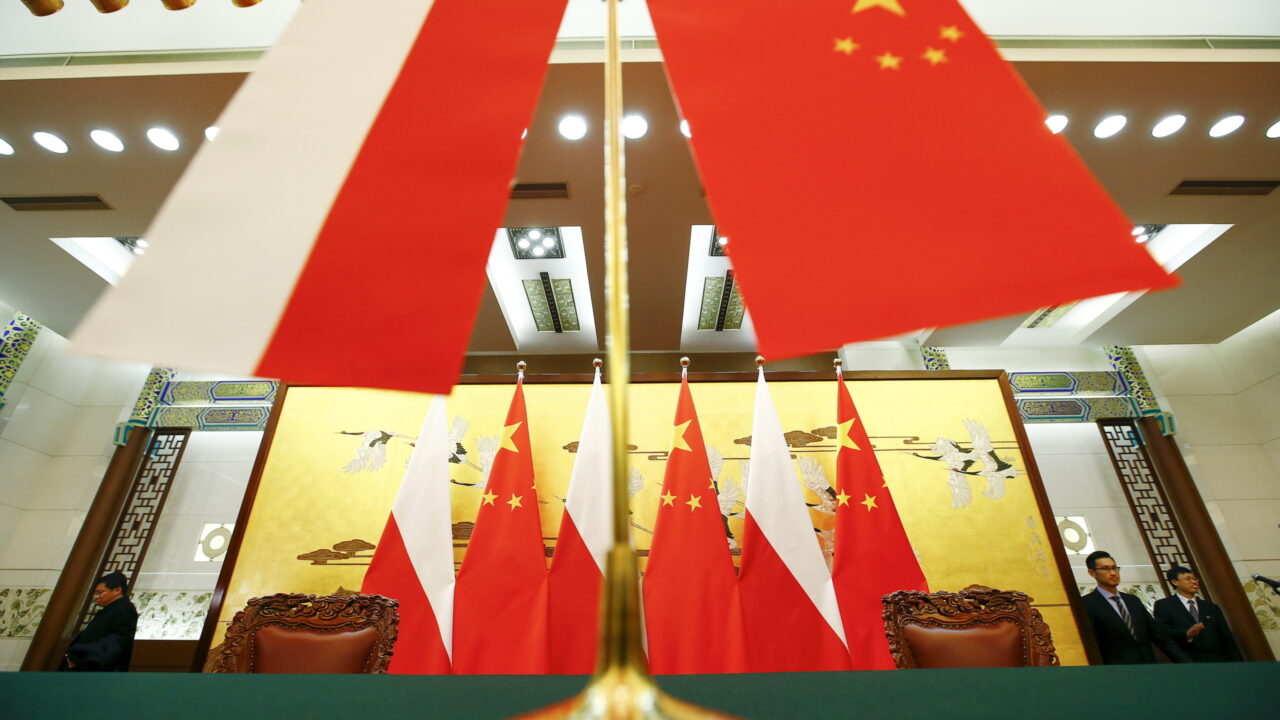Beyond business as usual: A China strategy for Poland
Poland needs to rethink its approach to China. The new government provides an opportunity for Warsaw to work with European partners to develop a China strategy that strengthens both Poland and the EU
Under a new liberal government, likely to form in mid-December, Poland’s voice is expected to become much louder in Europe. To a certain degree, we are likely to witness a Europeanisation of Polish foreign policy, with many anticipating Poland’s “return to Europe”. Warsaw is expected to play a more constructive role in shaping the European Union’s policies, and even securing its future against the backdrop of growing populism across Europe.
This will not be an easy task, especially given the scale of the challenges both at home and abroad. In this context, China is clearly not at the top of the incoming government’s list of foreign policy priorities. But Poland, like all European countries, needs to reevaluate its strategic interests vis-à-vis Beijing. The new government provides an opening to further Warsaw’s strategic thinking on China and shape its foreign policy towards Beijing and other Asian partners. It should work closely with its European partners to develop a Polish China policy as well as a broader approach to the Indo-Pacific.
Getting real on China
For over a decade, Poland’s strategy towards China has been guided by a desire to strengthen trade and investment cooperation with Beijing, with China seen as an economic powerhouse and an indispensable partner in a changing geopolitical landscape. In the hope of attracting Chinese investments, Poland joined the infamous 16+1 format for cooperation between China and central and eastern European countries and endorsed Beijing’s Belt and Road Initiative (BRI). Consecutive governments in Warsaw signed numerous bilateral agreements with Beijing too. These did not translate into a considerable influx of Chinese capital, however, with the cumulative value of Chinese foreign direct investment transactions in Poland between 2000 and 2019 reaching only €1.4 billion (compared to €22.7 billion in Germany).
While this ‘pragmatic’ approach largely reflected the international atmosphere of the post-2008 period, and as such could be seen as quite mainstream, it has not evolved much since then. The covid-19 pandemic and China’s tacit approval of the war in Ukraine, dressed as neutrality, contributed to shifting both political elites’ and public views on China, but have not yet forced Polish decisionmakers to seriously rethink the country’s relationship with Beijing. The existing forms of cooperation continue largely uninterrupted. In September 2023, for example, the Polish authorities again obstructed the introduction of legislation that would limit Chinese telecommunication operations in Poland, enabling Huawei’s continued involvement in building Poland’s 5G networks.
Hawkish rhetoric on China is on the rise in Poland and there is a growing awareness that a close China-Russia cooperation infringes upon Poland’s core security interests. In May, during a visit to Warsaw by Chinese special envoy to Europe Li Hui, deputy prime minister Wojciech Gerwel stated that “Poland notes with concern Beijing’s declarations concerning its persistent will to strengthen its bilateral relations with Russia” and warned that attempts to compare the status of Russia and Ukraine were “unacceptable”. However, in many aspects Sino-Polish relations have followed a well-known path with close to no national debate about de-risking or other crucial aspects of the current European debate on China. China remains on the sidelines of the public debate on all sides of the political spectrum. Compared to other countries in central and eastern Europe, such as Lithuania or the Czech Republic, Poland has been quiet on China.
Many of the problems that Poland will have to face very soon have a China component
However, many of the problems that Poland will have to face very soon have a China component. Much like in other European countries, these range from an over-reliance on pharmaceuticals made in China to the impact of a potential escalation over Taiwan on global supply chains. Warsaw should be particularly concerned though about the impact of China’s automotive industry on the Polish industrial sector. This is heavily dependent on exports to German automotive companies, which in turn fuel Germany-China trade. With German carmakers now threatened by China’s growing advantages in the electric vehicle sector, Polish industry may face lower demand from both Germany and other markets in the long run. The previous Polish government planned to create Poland’s first electric car, Izera, to boost Polish innovation and soft power, but the project has encountered many setbacks. In late 2022, the state-led venture finally teamed up with the Chinese company, Geely, to supply the platform for the vehicle. It now seems that Izera will in fact be a Chinese car disguised under a Polish brand, an outcome far from desired by its state-backed creators and a potential problem for Poland after the EU’s announcement of a probe into Beijing’s subsidies for electric car manufacturers. Geely has also appeared on the Ukrainian list of international sponsors of Russia’s war, adding another layer of unease to the project.
Poland therefore needs to rethink its framework for cooperation with China. This does not mean cutting ties or decoupling, nor necessarily leaving platforms such as 16+1 or the BRI. But Poland should analyse the impact of China’s industrial, economic, and security policies on its strategic interests – such as the end result of the war in Ukraine or the competitiveness of the Polish market – and use this knowledge to contribute to the Europe-wide effort to address issues such as China’s industrial overcapacities, interventionism, securitisation, and China-Russia relations. Germany’s new China strategy, which marked the end of its own “China illusion”, could serve as useful inspiration in this regard. Berlin’s strategy highlighted the need for EU states to reformulate their bilateral relations with Beijing. Although its implementation will be key, the very publication of the strategy indicated the overall change in the direction of Germany’s foreign policy, which will greatly affect the EU’s approach.
A closer cooperation with the EU will help Poland in this process, as the complexity of the challenges cannot be effectively addressed bilaterally with Beijing. China has also been skilful in exploiting intra-European tensions, in particular by offering market concessions to the EU’s strongest actors, Germany and France, which also have the most lucrative economic interests in China. This hampers the EU’s ability to formulate a more coherent and assertive stance against Beijing. European countries therefore need to be consistent when drawing ‘red lines’ for their relations with China and coordinated when implementing measures against Beijing’s actions. As European Commission president Ursula von der Leyen noted in a recent speech, “our relationship with China is a determining factor for our future economic prosperity and national security”.
Moving towards Indo-Pacific partnerships
Poland’s strategy should not only be centred around Beijing though. Moving away from a China-centric approach to one focused on diversifying its partners in Asia could be both politically and economically productive. The existing EU Indo-Pacific Strategy can serve as a departure point for Warsaw to further explore existing links and increased engagement with new partners.
Strengthening existing cooperation with countries such as Japan or South Korea could give Polish decisionmakers valuable perspectives on several topics, including China-Russia cooperation and stability in northeast Asia, which could help Warsaw to strengthen its capacity to uphold the open and rules-based international order that is crucial to its own security. The same applies to digital governance, connectivity, and green transition, three areas in which China has been trying to implement its own rules and standards globally to strengthen its own position. Fostering cooperation with Indo-Pacific partners in these domains could help Poland and Europe to establish common standards and a secure digital space in line with their own interests and values. Moreover, as a country without a colonial history in the Indo-Pacific, Poland could serve as a facilitator of debates among partners with more complicated backgrounds.
Warsaw can contribute to European efforts to de-risk from China, provided there is enough political will in the new government. Given the unprecedented challenge China presents as an increasingly security-focused country with ambitions to use the current geopolitical chaos to its own benefit, a Polish strategy on the Indo-Pacific could add a new quality to EU-China relations and strengthen the resilience of both Warsaw and the EU.
The European Council on Foreign Relations does not take collective positions. ECFR publications only represent the views of their individual authors.



